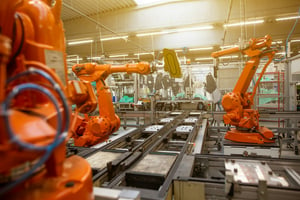The Importance Of Manufacturer's Instructions For Business
Manufacturer's instructions include valuable information and instructions that show how to operate, maintain, dispose and store products safely.
James Rowland
Commercial Director James leads Account Management, Sales and Marketing at Neathouse Partners.Date
12 April 2023Updated
03 April 2024
Table of contents
Related articles
Tags
Using manufacturer's instructions is important for businesses because they include valuable information and instructions that show how to operate, maintain, dispose and store machinery and equipment safely.
This can, in turn, help to prevent accidents and injuries in the workplace.
When it comes to running a business, health and safety should be a top priority for all employers, and one of the most effective ways to ensure workplace safety is to follow the manufacturer's instructions provided about the machinery, equipment, and products your employees use to get the job done.
The Importance Of Manufacturer's Instructions At Work
The instructions provided by manufacturers are designed by experts and provide detailed insight into how equipment should be used, maintained, and stored properly.
This can help to reduce the risks of workplace accidents due to misuse of machinery or improper storage procedures.
As a result, regardless of whether business owners and employees feel that they have the necessary experience and knowledge to operate machinery or equipment, they should always consult the instructions first to avoid dangerous situations, costly mistakes, and even legal consequences.
Instructions Are Essential For Safety
Using the manufacturer's instructions is crucial for ensuring workplace safety, avoiding accidents, and complying with legal regulations.
By following the manufacturer's instructions, employees can avoid potentially dangerous situations and minimize the risk of accidents, injuries, or even fatalities.
The instructions typically provide information on the proper installation, maintenance, and usage of the equipment, as well as any potential hazards and how to avoid them.
This information can help employees make informed decisions and take necessary precautions to prevent accidents.
By prioritising the use of these instructions, businesses can create a safer and more efficient work environment for their employees, and protect themselves from potential legal liabilities.
Why Manufacturer's Instructions Are Important To Employers
Using manufacturer's instructions is important for businesses from an employer's perspective for several reasons:
- Employee safety: By following the manufacturer's instructions, businesses can ensure that their employees are using products safely and correctly. This reduces the risk of injury or accidents on the job, which can lead to lower workers' compensation claims and higher employee morale.
- Liability protection: If a product is used incorrectly and causes injury or damage, the business can be held liable. By providing and enforcing the use of manufacturer's instructions, employers can protect themselves from potential lawsuits and financial losses.
- Productivity: Following the manufacturer's instructions can also improve productivity by ensuring that employees are using products in the most efficient and effective way. This can save time and reduce errors, leading to higher-quality products and increased customer satisfaction.
- Compliance with regulations: Many industries are subject to regulations that require businesses to use products in a certain way. By providing and enforcing the use of manufacturer's instructions, employers can ensure compliance with these regulations and avoid legal penalties.
- Training and education: Providing and enforcing the use of manufacturer's instructions can also serve as a training and educational tool for employees. This can help them become more knowledgeable about the products they work with, leading to improved job performance and career development.
Workplace Legislation Regarding The Use Of Manufacturer's Instructions
You have a duty as an employer to keep your staff safe and free from harm.
A key part of this includes adhering to manufacturers' instructions when operating machinery or equipment to minimise the risk of accidents.
In the UK, workplace legislation regarding the use of manufacturer's instructions is covered by several different regulations and standards, including:
- The Health and Safety at Work Act 1974: This act places a general duty on employers to ensure the health, safety, and welfare of their employees, and requires them to provide adequate training and information to enable employees to work safely.
- The Provision and Use of Work Equipment Regulations 1998 (PUWER): These regulations require employers to ensure that work equipment is safe and suitable for its intended use and that employees are provided with appropriate information, instruction, and training on its use.
- The Control of Substances Hazardous to Health Regulations 2002 (COSHH): These regulations require employers to ensure that hazardous substances are properly identified and assessed and that employees are provided with appropriate information, instruction, and training on how to handle them safely.
- The Personal Protective Equipment at Work Regulations 1992: These regulations require employers to provide appropriate personal protective equipment (PPE) to employees where necessary, and to ensure that employees are trained in its use and maintenance.
- There are also various British Standards (BS) that guide the use of manufacturer's instructions, including BS 7909:2011, which guides the use of electrical equipment in the entertainment industry, and BS EN 12464-1:2011, which provides guidance on lighting design for indoor workplaces.
Legal Implications Of Not Following Manufacturer's Instructions At Work
Not following the manufacturer's instructions at work can have serious legal implications for both employees and employers, including personal injury claims, breach of health & safety regulations, product liability claims and criminal charges.
If an employee is injured as a result of not following the manufacturer's instructions, they may be entitled to make a personal injury claim against their employer. This can result in significant compensation payouts and legal costs.
Employers have a legal duty to ensure the health and safety of their employees, and failing to provide proper training on the use of equipment or not following the manufacturer's instructions can be considered a breach of health and safety regulations. This can result in fines, legal action, and even imprisonment in severe cases.
If a faulty product causes injury or damage due to improper use or maintenance, the manufacturer and employer may be held liable for damages. This can result in legal action, product recalls, and loss of reputation for the business.
In some cases, not following the manufacturer's instructions can result in criminal charges being brought against employees or employers. For example, if the failure to follow instructions leads to a serious accident or injury, charges of gross negligence or manslaughter may be brought.
Summary
Complying with workplace legislation regarding the use of manufacturer's instructions is essential for employers that want to ensure the health, safety, and welfare of their employees, and to avoid potential legal liabilities.
Employers should ensure that they are familiar with the relevant regulations and standards and that they provide appropriate training and information to their employees on the use of equipment and substances in the workplace.
Next Steps
Neathouse Partners can help you to ensure that your business is compliant with the relevant legislation and standards regarding the safe use of machinery at work and that your policies are up-to-date.
If you would like support with managing and understanding your employer's responsibilities regarding the safe use, storage and disposal of equipment and products at work, please call 01244 893776 to talk to our friendly team.
Related blog posts

Common Manufacturing Safety Problems: Learning from Prosecutions

Health & Safety in the Age of Smart Manufacturing and Industry 4.0

Safeguarding Your Workplace: A Comprehensive Guide to Manual Handling
Have questions?
Get in touch today
Contact us, and our team will get back to you within 24 hours. We value your questions and are committed to getting them answered quickly.


Hello! I am Nicky
Just fill in the form below with your details, and I will arrange for a member of our team to give you a call.
By clicking, you agree to our Privacy Policy






